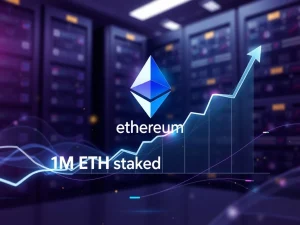Ethereum Regulation Chaos: Rep. Timmons Demands SEC Docs on Past Approach

The regulatory landscape for cryptocurrencies in the United States often feels like navigating a maze blindfolded. For participants in the Ethereum market, this uncertainty has been particularly pronounced. Now, a key voice in Congress is demanding answers, seeking clarity on the SEC’s historical stance on Ether (ETH).
Why Rep. Timmons Asked the SEC for Docs
Republican Representative William Timmons has formally requested that the U.S. Securities and Exchange Commission (SEC) turn over specific documents detailing the agency’s past views and actions concerning Ethereum (ETH). His target? The period under current SEC Chair Gary Gensler.
In a letter sent to SEC Chair Paul Atkins, Timmons argued that gaining access to these documents is crucial for both the public and Congress to understand the reasoning behind the SEC’s regulatory approach to digital assets.
Understanding SEC Ethereum Stance: A Timeline of Confusion?
Rep. Timmons’ letter points to what he calls the SEC’s “zigzagging approach” to ETH, contrasting past statements with more recent actions under Gary Gensler. Here’s a quick look at the perceived inconsistencies:
- 2018: William Hinman, then Director of Corporate Finance at the SEC, stated that the agency would not treat Bitcoin or Ether as securities. This provided a degree of clarity for the market.
- April 2023: SEC Chair Gary Gensler repeatedly declined to answer direct questions from Congress about whether the SEC views ETH as a security.
- Days before April 2023 testimony: The SEC had reportedly approved a formal investigation into whether ETH is a security. This internal action contradicted the public ambiguity from the Chair.
- A year later (2024): The SEC approved spot Ether exchange-traded funds (ETFs). Timmons notes that approving these products would typically only be appropriate if the underlying asset (ETH) is not considered a security.
- Weeks after ETF approval: The SEC reportedly closed its investigation into ETH.
Timmons argues that these shifts have created “destabilizing confusion for millions of American crypto-market participants.”
The Broader Context: SEC Crypto Transparency Push
This request from Rep. Timmons isn’t happening in a vacuum. It aligns with ongoing efforts to push for greater transparency from the SEC regarding its views on SEC crypto assets.
Notably, Timmons’ letter follows a Freedom of Information Act (FOIA) request initiated in 2023, backed by crypto exchange Coinbase. That FOIA sought documents related to the SEC’s internal discussions and views on ETH.
When the SEC denied the request, Coinbase sued the agency in June 2024. A court subsequently ordered the SEC to disclose certain documents. Coinbase has since posted thousands of these documents online, one revealing that New York prosecutors had previously sought the SEC’s opinion on ETH, but the SEC did not provide one.
The Impact of Regulatory Uncertainty
The lack of a clear, consistent stance on Ethereum regulation has significant implications:
- Market Volatility: Uncertainty can lead to price swings as investors react to perceived shifts in regulatory sentiment.
- Innovation Chill: Companies and developers may hesitate to build on or utilize Ethereum if its regulatory status is unclear, potentially stifling innovation in the US.
- Investor Confidence: Confusion about whether an asset is a security or not makes it difficult for investors to understand the rules and risks involved.
- Legal Challenges: The SEC’s approach has led to costly and time-consuming legal battles with crypto firms.
Rep. Timmons’ action, coupled with the Coinbase FOIA lawsuit, highlights the growing pressure on the SEC to provide clear, consistent guidance on digital assets.
What’s Next for Gary Gensler ETH Stance?
The request for documents puts pressure on the SEC to disclose internal records that could shed light on how decisions regarding ETH’s status were made under Gary Gensler’s leadership. While the SEC’s investigation into ETH is reportedly closed and ETH ETFs are approved, the fundamental question of whether the SEC *officially* considers ETH a non-security remains open in the eyes of many.
The outcome of Rep. Timmons’ request and the ongoing legal challenges could provide much-needed transparency, potentially influencing future regulatory actions and bringing more clarity to the Ethereum regulation landscape in the US.
Conclusion: A Call for Clarity
Rep. Timmons’ request for SEC documents on Ethereum is more than just political posturing; it’s a direct response to years of perceived regulatory inconsistency that has created significant confusion in the crypto market. By demanding transparency regarding the SEC’s past approach to ETH, Congress is pushing for the clarity that innovators, investors, and the public desperately need to navigate the complex world of digital assets. The coming months may reveal key insights into the SEC’s decision-making process, potentially paving the way for a more predictable regulatory future for Ethereum and other cryptocurrencies.










